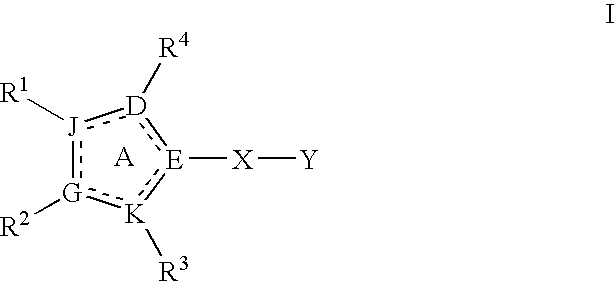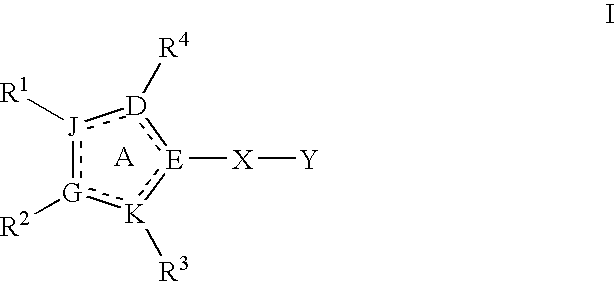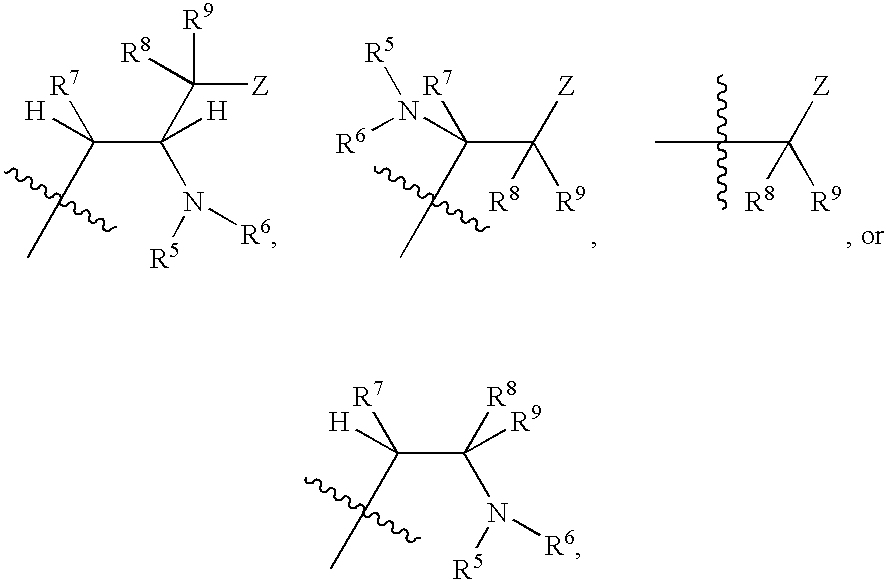Heterocyclic modulators of PKB
a technology of pkb and pkb, which is applied in the field of heterocyclic compounds, can solve the problem that the patent does not address the modulation of pkb
- Summary
- Abstract
- Description
- Claims
- Application Information
AI Technical Summary
Benefits of technology
Problems solved by technology
Method used
Image
Examples
working examples
2. Working Examples
[0283]The compounds of Formula I and Formula II were prepared according to the following synthetic Schemes and individual examples detailed herein. The compounds were named using Chemdraw Ultra, v.8.07. These Schemes and examples are provided for the purpose of illustration only and are not intended to limit the scope of the invention.
[0284]Unless otherwise noted, all materials were obtained from commercial suppliers and were used without further purification. Anhydrous solvents such as DMF, THF, DCM, and toluene were obtained from the Aldrich Chemical Company. All reactions involving air- or moisture-sensitive compounds were performed under a nitrogen atmosphere. Flash chromatography was performed using Aldrich Chemical Company silica gel (200-400 mesh, 60A) or Biotage pre-packed column. Thin-layer chromatography (TLC) was performed with Analtech gel TLC plates (250 mμ.). Preparative TLC was performed with Analtech silica gel plates (1000-2000.mu.). Preparative H...
example 1
[0288]N-((S)-2-amino-3-(4-(trifluoromethyl)phenyl)propyl)-5-(isoquinolin-6-yl)-1,3,4-oxadiazol-2-amine: This compound was synthesized as shown in Scheme 1.
[0289]
[0290]Isoquinoline-6-carbohydrazide: Isoquinoline-6-carboxylic acid (1.2 g, 6.94 mmol) purchased from Gateway Chemical Technology, Inc. was mixed with CDI (1.68 g, 10.4 mmol) in DMF (20 Ml) in a round bottom flask. After the mixture was stirred for 30 minutes at 20° C., anhydrous hydrazine (2 mL) was added and the resulting mixture was stirred at 20° C. for one hour. After removing the solvent at a reduced pressure, the remaining residue was mixed with 20 mL water. After filtration, washing with water and air drying, an off-white solid was obtained as the desired product. LCMS (API-ES) m / z (%): 188.0 (100%, M++H).
[0291]5-(Isoquinolin-6-yl)-1,3,4-oxadiazol-2-amine: A 3 M DCM solution of bromoformonitrile (0.2 mL, 0.6 mmol) (commercially available from Aldrich) was mixed with imidazole (0.157 g, 2.3 mmol) (commercially availab...
example 2
[0298]N-((S)-2-amino-3-(3-(trifluoromethyl)phenyl)propyl)-5-(3-methyl-1H-indazol-5-yl)-1,3,4-oxadiazol-2-amine: LCMS (API-ES) m / z (%): 417.2 (100%, M++H); 1H NMR (300 MHz, CD3OD) δ ppm 2.61 (s, 3H) 2.71 (dd, J=13.56, 8.85 Hz, 1H) 2.94 (dd, J=13.56, 4.90 Hz, 1H) 3.49 (s, 1H) 3.69-3.79 (m, 1H) 4.20-4.29 (m, 1H) 4.32-4.41 (m, 1H) 4.99 (b, 2H) 7.39-7.53 (m, 5H) 7.96 (dd, J=8.85, 1.51 Hz, 1H) 8.20 (s, 1H). This compound was synthesized in a similar manner as that described for Example 1 in Scheme 1 using 3-methyl-1H-indazole-5-carboxylic acid as the starting material instead of isoquinoline-6-carboxylic acid. 3-Methyl-1H-indazole-5-carboxylic acid was prepared as shown in Scheme 2. To introduce the side chain, (S)-tert-Butyl 4-(3-(trifluoromethyl)benzyl)-1,2,3-oxathiazolidine-3-carboxylate-2,2-dioxide was used which was prepared in a similar manner as that described for (S)-tert-Butyl 4-(4-(trifluoromethyl)benzyl)-1,2,3-oxathiazolidine-3-carboxylate-2,2-dioxide in Scheme 1, using (S)-2-(...
PUM
 Login to View More
Login to View More Abstract
Description
Claims
Application Information
 Login to View More
Login to View More - R&D
- Intellectual Property
- Life Sciences
- Materials
- Tech Scout
- Unparalleled Data Quality
- Higher Quality Content
- 60% Fewer Hallucinations
Browse by: Latest US Patents, China's latest patents, Technical Efficacy Thesaurus, Application Domain, Technology Topic, Popular Technical Reports.
© 2025 PatSnap. All rights reserved.Legal|Privacy policy|Modern Slavery Act Transparency Statement|Sitemap|About US| Contact US: help@patsnap.com



